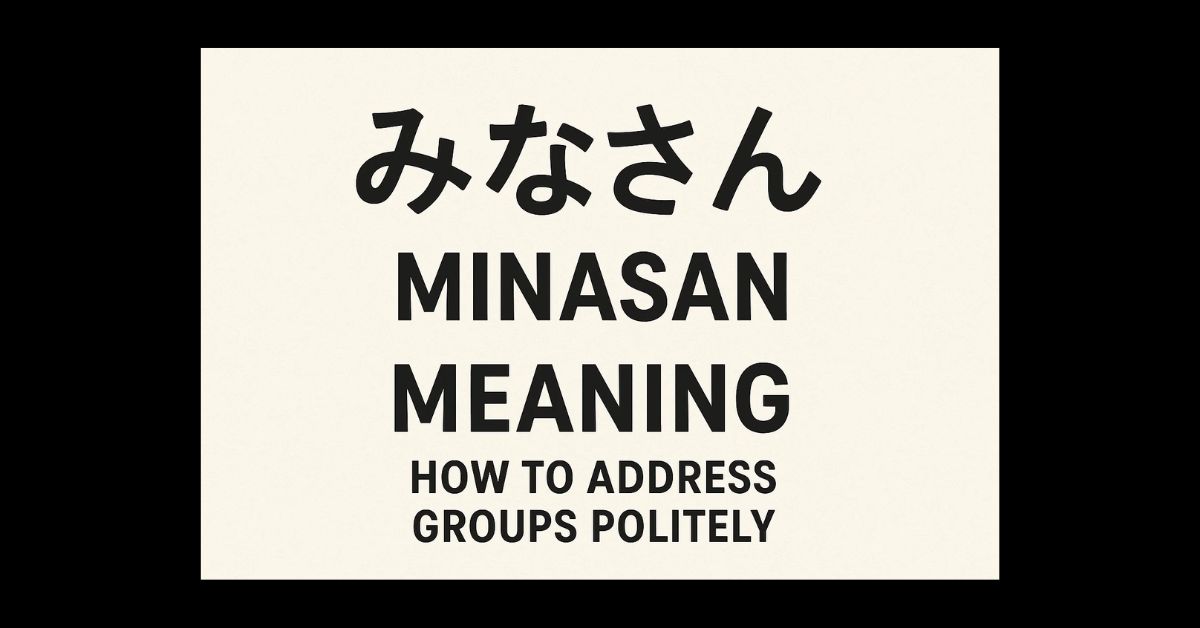In Japanese, being intelligent and speaking to a group politely matters. “Minasan” is an expression you’ll hear used all the time, and it means “everyone” in a polite manner. “Minasan” is derived from the two words “mina” (everyone) and the polite word “san”. When you use the word minasan, you are being friendly however respectful. This is ideal to use in the workplace, schools, or when talking to a group of strangers.
A lot of learners confuse minasan, minna, and mina-sama, but they belong to a different level of respect. Minna is an informal one and is the opposite for close friends. Mina Japanese meaning is just “everyone,” but context is central. When you’re thinking about what does mina mean in Japanese, it means “all” or “everyone,” but with san, it becomes polite. Relating the proper word to the suitable context indicates that you realize Japanese group phrases, social rules, and formal and informal conversation.
What Does Minasan Mean in Japanese?
The word “minasan” is a well-mannered expression of “everyone” in Japanese. The “minasan” meaning is resulting from two components: “mina” (meaning “everyone”) and “san,” a polite suffix. Therefore, when you use minasan, you are being polite and formal at once. It is usually employed in schools, meetings, and public notices.
If you’re wondering what mina in Japanese means, it means “all” or “everyone.” That is why groups are received with such expressions as minasan, ohayou gozaimasu. An acceptance of mina Japanese meaning enables you to use the correct word in polite or informal situations. It’s an important aspect of learning Japanese greetings and knowing how to communicate as a group in Japan.
Minasan vs. Minna vs. Mina-sama: Understanding the Differences
In Japanese, there are three main ways to talk to a group, and each one shows a different level of politeness.
1. Minna (みんな)
Politeness level: Very casual and relaxed
Great for: Friends, family, kids, or people you know well
Example: “Minna konnichiwa!” (みんな、こんにちは!) – “Hey everyone!”
2. Minasan (皆さん)
Politeness level: Respectful and semi-formal
Great for: Classmates, colleagues, or mixed groups of people
Example: “Minasan, ohayou gozaimasu.” (皆さん、おはようございます。) – “Good morning, everyone!”
3. Mina-sama (皆様)
Politeness level: Very formal and highly respectful
Great for: Customers, large viewers, or people you don’t know
Example: “Mina-sama arigatou gozaimashita.” (皆様、ありがとうございました。) – “Thank you very much everyone!”
When to Use Minasan: Context Matters
Being aware of how to use minasan makes you more natural in the Japanese language. Minasan meaning is what you politely say instead of “everyone,” but mina meaning Japanese simply is “everyone” or “all” alone. Use minasan in school, at the office, or in public areas to be polite and follow Japanese group phrases.
Classroom or Work Settings
In the office or school, minasan is the ideal word to address a group in a polite way. The minasan meaning shows respect, and the mina meaning Japanese is simply “everyone” with no reserve. Applying minasan to the office or class is following Japanese group communication rules.
Example:
“Minasan、 kaigi o hajimemasu.” (皆さん、会議を始めます。)
Translation: “Everyone, let’s start the meeting.”
Want to explore Japan’s culture?
If you’re a lover of Japanese culture, studying words such as minasan connects you more to people. The meaning of minasan means polite language, while the mina meaning Japanese basic just shows “everyone.” Knowing how to apply minasan is part of studying true Japanese expressions and everyday customs.
Semi-formal Social Gatherings
At community meetings or casual events, minasan is polite and suitable. The minasan meaning expresses gentility, and the mina meaning Japanese supports you to communicate with all people respectfully.
Example:
“Minasan omedetou gozaimasu!” (皆さん、おめでとうございます!)
Translation: “Congratulations, everyone!”
Public Announcements
When addressing a crowd or various groups, minasan is a polite and safe option. The minasan meaning suits public address, and the mina meaning Japanese repeats to us that it means “everyone” respectfully.
Example:
“Minasan、 chui shite kudasai.” (皆さん、注意してください。)
Translation: “Everyone, please pay attention!”
Cultural Nuances and Tips for Using Minasan Correctly
When you’re talking Japanese, whether to use the correct word like minasan is situation-dependent. Minasan meaning is polite, while mina meaning Japanese is simply “everyone.” Using minasan shows that you know Japanese social rules and good group communication. Such small decisions can make your speech more natural and polite.
Reading the room:
- Always notice how others are speaking before using minasan.
- If people are formal, match their tone to show respect.
Age considerations:
- Use minasan when talking to people older than you.
- It’s better than using minna, which may sound too casual.
Written communication:
- In emails or formal letters, minasan is more suitable than minna.
- For very official writing, consider using mina-sama instead.
Combining with other expressions:
- Minasan is often used with polite hello like “konnichiwa” or “otsukaresama.”
- Example: “Minasan, otsukaresama desu!” means “Great job, everyone!”
Group size matters:
- Use minasan for average to large groups where a respectful tone fits.
- For just 2–3 close friends, minna feels more natural.
Use in public speaking:
- When speaking to an audience or giving a speech, start with minasan.
- It sets a polite and respectful manner right from the beginning.
Tone matching with content:
- If your message is formal or serious, minasan fits better than casual forms.
- Match your greeting style with the purpose of your speech or message.
Paying attention to when and how to employ minasan shows that you’re learning actual Japanese protocol. It’s a little word, but it’s rich in meaning in Japanese group words.
Related Article: Genki Desu Ka Meaning and How to Use It Naturally
Common Mistakes to Avoid When Using Minasan
Even when you are aware of minasan meaning, it is simple to make minor errors while speaking. Most learners get confused with the other forms of minasan, and it can effect how polite or natural-sounding they are. Knowing the mina meaning Japanese and getting the right form allows you to be direct clear of blushing in Japanese group communication.
Using “minna-san”:
- This is incorrect! You shouldn’t mix the casual “minna” with “san.”
- Say minasan or minna, depending on how formal the situation is.
Overusing honorifics:
- Saying minasan in casual hides can feel too rigid.
- Save it for times when you need to show respect.
Inconsistent formality:
- Don’t use minasan and then speak in super casual Japanese. It sends mixed signals.
- Try to match your reception and tone throughout the conversation.
Forgetting the situation:
- Using minasan in the wrong setting can feel off.
- Think about where you are and who you’re talking to before using it.
Assuming minasan fits every group:
- Minasan is polite, but not always the best choice.
- Use minna with close friends and mina-sama for very official situations.
Mispronouncing minasan:
- Some learners say “minna-san” by mistake.
- Staff with minasan (mee-nah-san) for proper group greetings.
Beyond Basic Greetings: Expanding Your Japanese Communication Skills
Learning how to say “hello” with minasan is a wonderful beginning, but true development rises from learning how to say the opposite more naturally in Japanese. The minasan meaning teaches you polite group greetings, while the mina meaning Japanese finds the source of the word “everyone.” By employing the suitable expressions at the proper times, you become more easy-sounding. Such hints play an important role in Japanese group communication.
As you progress in your language learning, try to combine minasan with words such as “otsukaresama” or “konnichiwa” so that you sound more natural. Knowing the mina Japanese meaning allows you to choose the suitable level of politeness. This is important for learners wishing to learn Japanese greetings, social expressions, and day-to-day conversation. Continue learning outside the basics so that you may truly connect with individuals in Japan.
Conclusion: The Power of Proper Group Address in Japanese
Using minasan correctly may look unimportant, but it can meaningfully alter the impression people have of you when communicating in Japanese. It returns your awareness of Japanese social protocol and how to be a good team player.
The minasan meaning is an easy way of saying “everyone,” and it suits practice in work, school, or public settings. Understanding the mina meaning Japanese contributes to you in selecting the suitable degree of politeness. If you’re beginning a meeting or greeting a gathering, using minasan suitably makes you sound more natural and self-secure in Japanese.
Q&A Section: Common Questions About Minasan
Q: How to greet a group of people in Japanese?
Use “minasan” to politely say hello to a group. For casual groups, “minna” works fine too.
Q: Is Minasan polite?
Yes, minasan is a polite way to say “everyone” and is often used in formal or semi-formal situations.
Q: How to use minasan?
Start your sentence with minasan when speaking to a group, then follow with a polite phrase like “ohayou gozaimasu.”
Q: Is “minasan” more formal than “minna”?
Yes, minasan is more polite than minna, which is casual and used with friends, family, or close people.
Q: Can I use “minasan” with my close friends?
You can, but it may sound too official. With close friends, it’s more natural to use minna instead.
Q: What is the kanji for “minasan”?
Minasan is written as 皆さん — 皆 (mina) means “everyone,” and さん (san) is the polite honorific.
Q: How do I pronounce “minasan” correctly?
Say it as mee-nah-san, with each syllable clear and equal. Avoid saying “minna-san,” which is incorrect.
Q: When should I use “mina-sama” instead of “minasan”?
Use mina-sama in very formal positions like speeches, customer service, or when addressing people with high status.

